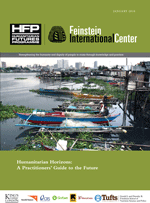Climate Change: Humanitarian Consequences

Report
The objective was to synthesize the wealth of climate information specifically linked to consequences across the globe that requires the attention of the humanitarian community.
- E-survey was carried out (see below)
- Literature review – over 200 peer-reviewed documents and gray literature were consulted
- Two case studies – Ethiopia and Bangladesh- were analysed in greater depth
Please see the full report which SEI produced for the Humanitarian Horizons program. Humanitarian Horizons is being coordinated jointly by Feinstein International Center (FIC) at Tufts University, and by Kings College, London. The report is published by FIC at:
Survey
In April 2009, an electronic survey was organized to capture the main differences in understanding and requirements between two sectors: those generating climate information and those using it to humanitarian ends.
Targeted 66 actors known to generate, repackage, or use climate information.
22 respondents completed the survey:
- Four self-reported generators or near-generators of climate science information; were grouped as generators (G)
- No one considered him/her self an end user or beneficiary. The rest are grouped as non-generators or users (NG)
Summarized Findings:
- Respondents asked to consider timeline of impacts of climate change
Overall, climate science users (NG) see climate change as significantly more immediate that the science generators (G). Interesting given analysis in which G found many phenomena more important than NG. There seems to be a key distinction between immediacy and importance in the community of practice.
- Respondents asked to complete the sentence: my work requires knowing that a climate outcome or result is:
With a standard IPCC category: virtually certain, extremely likely, very likely, likely, or more likely than not (>50%) Eight of 21 respondents, but no G, require a minimum of 90% confidence. Second most common answer was >66%, from one-third both groups May reflect non-representative profiles of respondents or a trend towards a growing tolerance for large uncertainty among both groups
- Respondents asked to rank a list of 12 phenomena by a.) How important each was to the respondent’s professional mandate and b.) The level of confidence they place in the projections of their evolution with choices from 1-5 (Most to Least Important or Confident)
Most important phenomena for NG: global projections, temperature, SLR. For G: drought frequency, intensity, storm frequency and climate variability Least important phenomena for NG: floods. For G: local projection Greatest confidence held: For NG in precipitation. For G in local projections Least confidence in temperature, global projections and SLR for both
Analysis underscores the colossal discrepancy between the two subgroups: the elements in which climate scientists (G) have the greatest confidence are rarely those that are most important to the humanitarian agencies (NG) and conversely, elements most important to humanitarian agencies are routinely subject to the greatest lack of confidence by the climate scientists
Two-thirds of G in e-survey and over 40% of NG have “no doubt” that attribution of an event between climate variability or climate change makes a difference to their work. Second most common answer “not at all” only by NG. → trend: the closer you place your efforts to end-users, the more likely you are to see attribution as trivial
- Respondents asked to prioritize two most important human consequences of climatic change making populations based on knowledge they have generated, transmitted or received. Most common overall response was reduced access to resources (8/14 NG; 1/3 G). Second most common overall priorities: conflict tied to poverty for G, and tied to poverty and food security for NG
Please see the report published by the Feinstein International Center which contains the full results of the survey:
Morinière, L. C. E., Taylor, R., Hamza, M., & Downing, T. (2009). Climate Change and its Humanitarian Impacts, Feinstein International Center
A further synthesis output Humanitarian Horizons: A Practitioners’ Guide to the Future published by the Feinstein International Center is available.
(0) Comments
There is no content